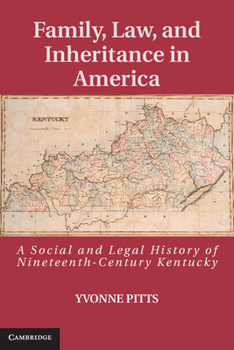Family, Law, and Inheritance in America
(Part of the Cambridge Historical Studies in American Law and Society Series)
Yvonne Pitts explores inheritance practices by focusing on nineteenth-century testamentary capacity trials in Kentucky in which disinherited family members challenged relatives' wills. These disappointed heirs claimed that their departed relative lacked the capacity required to write a valid will. These inheritance disputes crisscrossed a variety of legal and cultural terrains, including ordinary people's understandings of what constituted insanity and justice, medical experts' attempts to infuse law with science, and the independence claims of women. Pitts uncovers the contradictions in the body of law that explicitly protected free will while simultaneously reinforcing the primacy of blood in mediating claims to inherited property. By anchoring the study in local communities and the texts of elite jurists, Pitts demonstrates that "capacity" was a term laden with legal meaning and competing communal values about family, race relations, and rationality. These concepts evolved as Kentucky's legal culture mutated as the state transitioned from a conflicted border state with slaves to a developing free-labor, industrializing economy.
Format:Hardcover
Language:English
ISBN:1107035503
ISBN13:9781107035508
Release Date:May 2013
Publisher:Cambridge University Press
Length:213 Pages
Weight:1.10 lbs.
Dimensions:0.9" x 6.1" x 9.1"
Customer Reviews
0 rating





